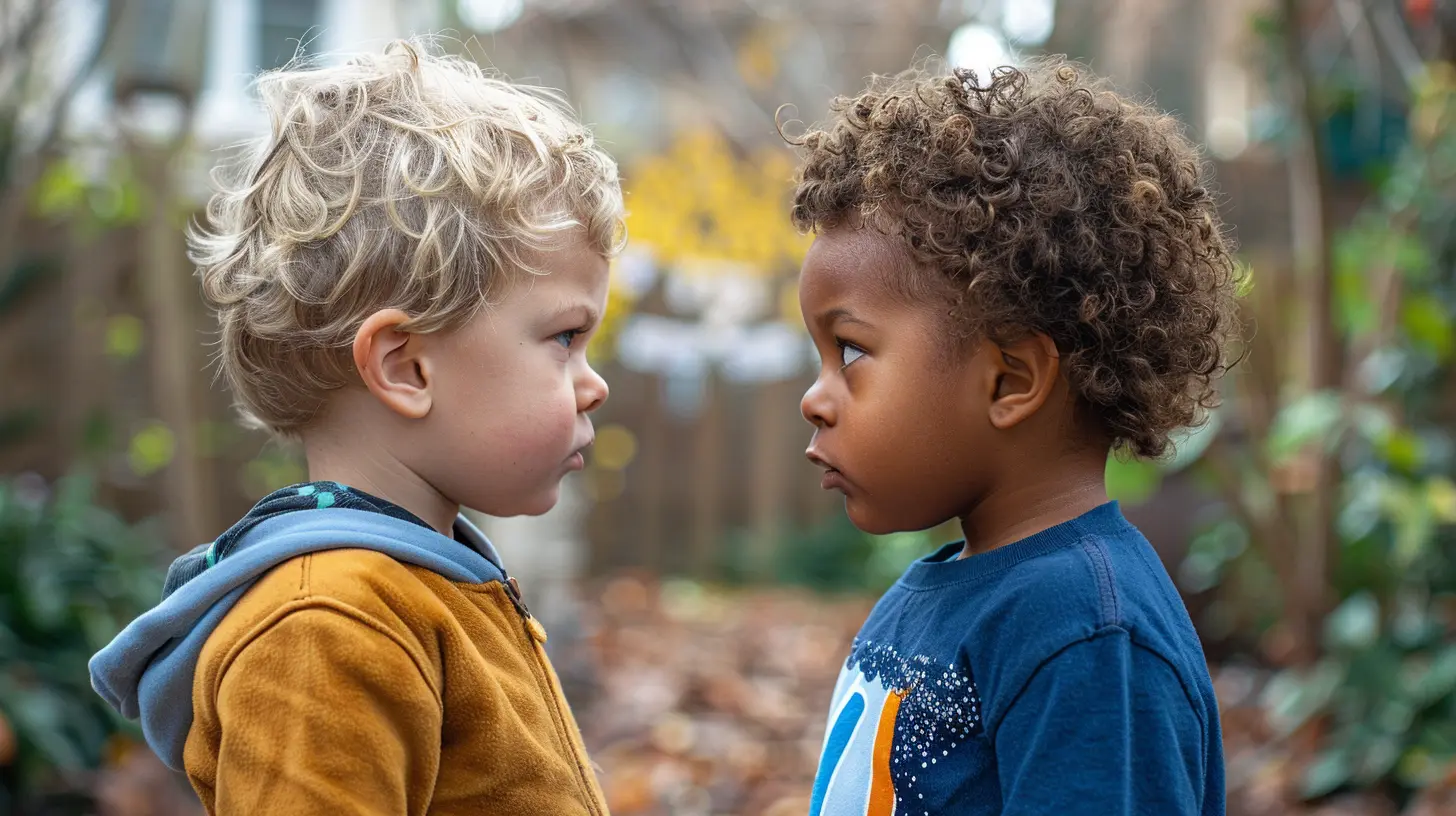How to Deal with Sibling Rivalry That Spills Over into School
8 May 2025
Sibling rivalry is as old as time itself. From arguing over the last cookie to who gets to sit in the front seat, siblings have their fair share of squabbles. But what happens when those disagreements don’t just stay at home? When sibling rivalry starts affecting their behavior at school, it becomes a bigger issue—one that needs to be tackled head-on.
If you're a parent facing this challenge, don't worry—you're not alone. Let’s dive into practical ways to manage sibling rivalry that extends beyond the walls of your home and into the classroom. 
Understanding Why Sibling Rivalry Spills Into School
Sibling rivalry is completely normal, but when it starts affecting a child’s school life, it’s important to understand why. Here are some of the key reasons:- Competition for Attention – If one sibling feels overshadowed by the other, they may act out or try to get noticed at school.
- Comparison Issues – Teachers or peers comparing siblings can fuel resentment. No child wants to hear, “Why can't you be more like your brother?”
- Unresolved Home Conflicts – If constant fighting happens at home, kids might carry that tension to school, especially if they attend the same school or class.
- Peer Pressure & Social Dynamics – Friends and classmates can sometimes amplify sibling tensions, making conflicts worse.
Understanding the roots of the problem allows you to take proactive steps toward reducing sibling rivalry before it starts affecting academics, social dynamics, and emotional well-being. 
Signs Your Child’s Sibling Rivalry Is Affecting School Life
Not sure if your kids’ rivalry is spilling into school? Here are some red flags to watch for:- Frequent Complaints from Teachers – If teachers notice tension between siblings at school or report repeated conflicts, it’s a sign that the rivalry isn’t staying at home.
- Bullying or Teasing – One sibling may be bullying or teasing the other in front of their friends, diminishing their confidence.
- Lack of Focus or Academic Decline – If a child is more preoccupied with sibling issues than schoolwork, grades and focus may take a hit.
- Avoiding Each Other at School – While it’s normal for siblings to have different friend groups, an extreme effort to stay apart or act as if they’re strangers could signal underlying issues.
Recognizing these signs is half the battle—now, let’s talk about fixing them. 
How to Manage Sibling Rivalry at Home to Prevent School Issues
Since school conflicts often stem from home dynamics, resolving things at home is crucial. Here’s how:1. Encourage Cooperation Over Competition
Kids naturally compare themselves to their siblings, but as a parent, you can help shape that narrative. Instead of fostering competition, promote teamwork.- Use “we” statements like, “Let’s see if we can all get the house cleaned up together before dinner.”
- Encourage activities where they work together rather than against each other—think of puzzles, team sports, or cooking together.
- Acknowledge each child’s unique strengths rather than comparing them.
2. Set Clear Expectations on Behavior
Make it clear that negative behavior—whether at home or school—is not acceptable. Sit them down and establish family rules like:- No name-calling or hurtful teasing.
- No physical fights (even playful ones that get out of hand).
- Treat each other with respect no matter where you are.
When kids know the ground rules, they’re more likely to think twice before mistreating a sibling in school.
3. Give Each Child One-on-One Attention
Sometimes, rivalry stems from feeling overlooked. Carve out special time for each child, whether it’s reading a bedtime story, taking them for ice cream, or simply listening to their stories.When kids feel individually valued at home, they’re less likely to seek validation by acting out elsewhere.
4. Teach Conflict Resolution Skills
Let’s be real—your kids will argue. Rather than stopping all disagreements, teach them how to handle conflicts the right way:- Encourage calm discussions instead of shouting matches.
- Teach them about compromise—not every disagreement has a clear winner.
- Promote problem-solving rather than blame-shifting.
If they can resolve fights at home in a healthy way, they’ll carry those skills into school too. 
How to Handle Sibling Rivalry That Shows Up at School
Even with home efforts, sibling rivalry may still creep into school life. If that happens, here’s how to tackle it:1. Communicate with Teachers & School Staff
Teachers play a crucial role in spotting and managing sibling conflicts in school. If sibling rivalry is an issue:- Speak with their teachers and explain the situation.
- Ask the school to intervene if bullying between siblings is occurring.
- Request that teachers avoid comparisons between siblings in front of the class.
The more the school is aware, the better they can help manage the situation.
2. Set Boundaries at School
Sometimes, a little space is all that’s needed. If your children struggle to coexist at school:- Encourage them to have separate friend groups and find their own individual identities.
- If possible, request different classrooms or schedules.
- Let them know they don’t have to eat lunch or play together if they need space.
Giving them independence in school can help ease tension and prevent conflicts from boiling over.
3. Reward Positive Interactions
Reinforce positive sibling relationships by acknowledging and rewarding good behavior. If they manage to get through a day without fighting at school, praise them or offer small rewards like extra screen time.Showing appreciation for their efforts to get along will encourage them to continue fostering a respectful relationship.
4. Address the Underlying Issues
If school conflicts persist, it may indicate deeper issues like jealousy, insecurity, or an emotional need that isn’t being met. Have open conversations with each child to understand their concerns.Sometimes, involving a school counselor or family therapist can help uncover and resolve hidden frustrations that are fueling the rivalry.
When to Seek Professional Help
If sibling rivalry significantly affects your child’s school life—leading to stress, anxiety, or self-esteem issues—it might be time to seek professional guidance. Some signs include:- One sibling shows signs of bullying or aggression that doesn’t improve.
- The rivalry leads to serious emotional distress for one or both children.
- Conflict resolution strategies aren’t working despite multiple efforts.
A child psychologist, therapist, or school counselor can provide tools to help manage sibling relationships in a healthy way.
Final Thoughts
Sibling rivalry is inevitable, but it doesn’t have to control your child’s school experience. By fostering a supportive home environment, teaching conflict resolution, and working with teachers, you can help your children navigate sibling relationships in a way that promotes personal growth rather than constant competition.At the end of the day, siblings may argue, but they’re also lifelong companions. With the right guidance, they can learn to support—not sabotage—each other, both at home and in school.
all images in this post were generated using AI tools
Category:
Sibling RivalryAuthor:

Austin Wilcox
Discussion
rate this article
3 comments
Thornewood Marks
Navigating sibling rivalry is a challenge that can teach resilience and empathy! Embrace these moments as opportunities for growth. Encourage your children to celebrate each other’s strengths and work through conflicts together—these skills will not only strengthen their bond but also prepare them for the world ahead!
May 18, 2025 at 4:34 AM

Austin Wilcox
Absolutely! Encouraging collaboration and celebrating differences can turn rivalry into valuable life lessons, benefiting both their relationship and future interactions.
Rina McLoughlin
Sibling rivalry spilling into school? Just remember, if they can negotiate over toys at home, they can negotiate snack trades in class too!
May 13, 2025 at 4:13 PM

Austin Wilcox
Absolutely! Teaching negotiation skills at home can empower siblings to resolve conflicts constructively, even in school settings. It's all about fostering positive communication!
Sierra McTiernan
It's tough to navigate, but understanding and support can help immensely.
May 9, 2025 at 4:50 AM

Austin Wilcox
Thank you for your insight! Understanding and support are indeed key to addressing sibling rivalry effectively.



